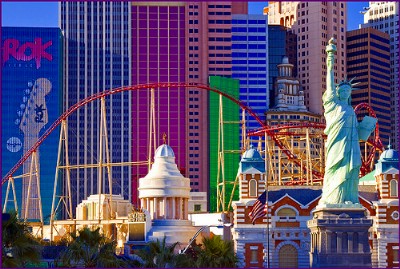|
Q: Will Las Vegas Follow Atlantic City Into Oblivion? |
 |
 |
 |

The Trump Taj Mahal has shut down. It’s sad that the New Jersey shore town has closed five of it’s major casinos in the past couple of years. Is it just local, or are people tired of losing their money at casinos, and it will soon happen in Las Vegas? Barbara J., Providence RI
A: OK, let’s imagine a sad Las Vegas scenario. The glitz and glitter will fade and the Nevada desert will eventually turn Sin City into a ghost town, a lonely haven for gophers and rattlesnakes. Future archeologists will dig into the ruins of once-great Caesars Palace on the Strip.
Seriously, I don’t think Vegas is dying. When newspapers printed an obituary for humorist Mark Twain, he issued a statement: “The reports of my death are greatly exaggerated.” The same applies here. In fact, as far as Sin City is concerned, reports of its demise have been reported at least three times in recent history.
The first happened after Boulder Dam was completed in the late 1930s. The sleepy little town of Las Vegas had grown its population from several hundred to more than 50,000 after a mighty dam loomed over the Colorado River just a few miles away. With the Great Depression gripping the nation, that building boom brought thousands of eager workers and families from all over the nation.
Dam workers used some of their hard-earned cash on pleasures. Just 20 minutes away from the dam site was little old Las Vegas, where gambling and just about everything else was legal. Through the late 1930s and into the early 1940s, Las Vegas flourished. The little gambling town just wouldn’t fade away.
During World War II, nearby military bases and war plants increased financial growth in the city. Instead of fading away, Las Vegas experienced another boom. Hotels, restaurants and casinos went up on the downtown main drag, Fremont Street. Then, even more luxurious resorts spread to Las Vegas Boulevard, called the Strip.
A new wave of investors arrived in the 1950s. Frustrated by anti-gambling laws in New York, Pennsylvania and New Jersey, some shady guys decided to invest their hard-stolen Mob money into Las Vegas. Hey, it ain't called Sin City for nothin'!
Another report of the demise of Vegas was in the 1960s and 1970s, when the economy took a dip and enough tourists weren't showing up. However, the problem eased when New Jersey’s Steve Wynn came to town and began building even bigger and better casino resorts along the Strip.
For the next 30 years, Vegas boomed. And today, with the economy once more iffy, the naysayers again predict the end of Sin City. However, look at current visitor and gambling revenue figures, and you'll see that reports of Sin City's death are once again greatly exaggerated. |